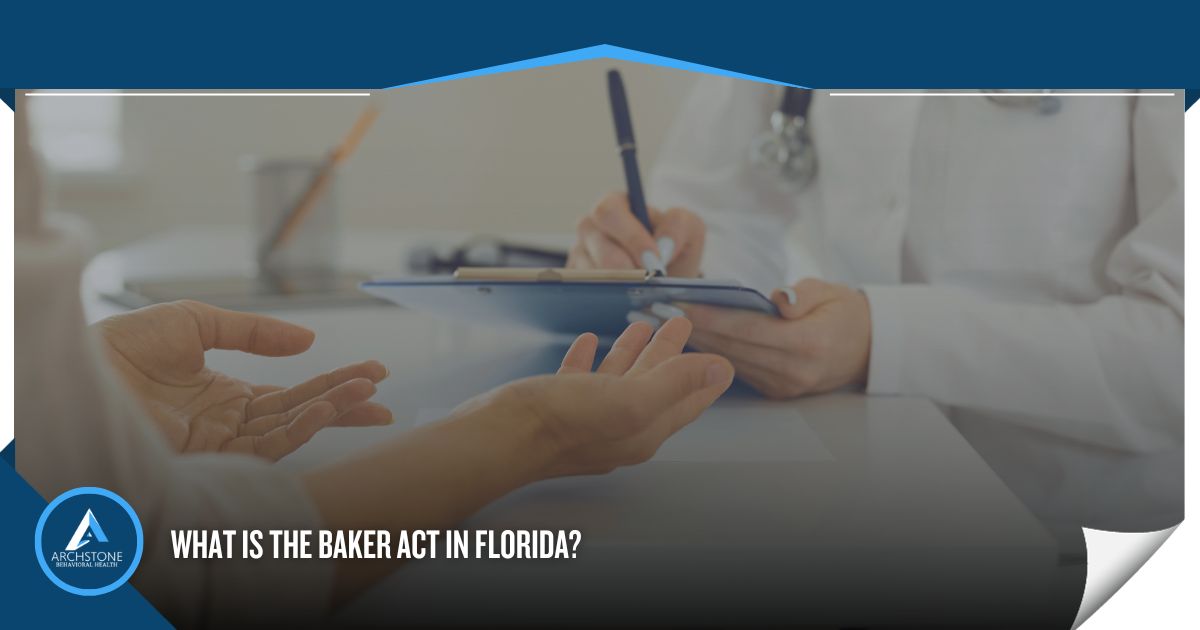What is the Baker Act in Florida?
Get Help Now

In some cases, it may benefit a person with mental illness to receive treatment involuntarily. The Florida Baker Act can help people with mental illness get the treatment they need during a crisis or when they cannot make decisions in their best interest.
This article will explore how the Baker Act works, how to use it to help someone you love, and how to find treatment. Reach out to the compassionate specialist at Archstone Behavioral Health to learn more about the Florida Baker Act or explore our holistic, effective substance use disorder treatment programs.
What is the Baker Act?
The Baker Act is named after Maxine Baker, a legislator who played a crucial role in creating this rule. The Baker Act is also known as the Florida Mental Health Act. This act is a statute in Florida that was enacted to help people with mental illness receive the care they need. The Baker Act allows individuals to be held involuntarily for a mental health assessment and treatment.
People with mental illness require effective, compassionate treatment and ongoing support. Research shows that only about 1/3 of people with mental health disorders get the treatment they need to overcome them and manage their symptoms. The Baker Act was enacted to improve the lives of people with mental illness by helping them get the care they need.
Concerned loved ones and individuals in the community may enact the Baker Act to help a loved one with mental illness who cannot or will not access the treatment they need.
When Should I Use the Baker Act?
Using the Baker Act may seem like a significant step, and some people may hesitate to use it. However, the Baker Act is a necessary tool to help individuals struggling with the symptoms of mental health disorders. Often, mental illness can make it difficult for people to recognize the need for help or interfere with the ability to seek treatment. In those cases, it may be up to concerned loved ones to acknowledge the need for treatment and take action.
Here are some of the signs you may need to enact the Baker Act to help a loved one with mental illness:
- Your loved one is at risk of harming themselves or others
- Other methods of convincing them to seek treatment have failed
- Your loved ones cannot make healthy decisions for themselves regarding their care and mental health treatments
- The symptoms of a severe mental health disorder require immediate attention
- Your loved one is in crisis and needs immediate care
The criteria for enacting the Baker Act are stringent. This can prevent people from filing the Baker Act when it is unnecessary. The Baker Acts is intended to help people who meet specific criteria, including:
- Those experiencing delusions and hallucinations
- People who are at risk for self-harm or suicide
- People who pose a risk to others in the community
- Those who are unable to care for themselves
- People who are experiencing severe symptoms of depression or anxiety
If your loved one exhibits any of these signs, you may be able to use the Baker Act to get them the help they need.
What is the Process of Using the Florida Baker Act?
Law enforcement officers, mental health professionals, or concerned family members can initiate the Baker Act process. Once the Baker Act is initiated, the person with mental illness will be transported to a facility where a mental health professional will assess them.
If the person meets the criteria for involuntary assessment and treatment, they will be held in their receiving facility for up to 3 days (72 hours). While in the receiving facility, they will be evaluated and receive a diagnosis. The team will use the information gathered during the assessment to create a treatment plan to best meet their needs.
After the initial 72 hours, the person may leave the facility if they meet the criteria for release. If the mental health treatment team believes they are still at risk, they may be held in the facility for additional treatment. Treatment typically includes:
- Behavioral therapy
- Medications
- Group support
- Education
- Aftercare planning
If you believe someone in your life requires immediate assessment and treatment for mental illness, you may initiate the Baker Act process by following these steps:
- Contact your local crisis intervention team or police department to ask for assistance.
- Describe the situation, including your loved one’s behaviors, and explain why you believe they need immediate attention.
- A mental health professional will conduct an evaluation to determine if your loved one requires involuntary commitment under the Baker Act.
- If your loved one does meet this criteria for involuntary commitment, the mental health professional will apply for involuntary examination and submit it to a mental health treatment facility.
- The person will be transported to the mental health facility and undergo evaluation and treatment.
The Baker Act must only be used in cases where a person poses a threat to themselves or others or has become unable to care for themselves or make decisions in their best interest. Consult with mental health professionals before beginning the process of a Baker Act commitment and ensure you have support throughout the process.
Learn More About the Florida Baker Act
Using the Baker Act can ensure your loved one gets treatment for severe mental illness. However, the process can be emotional and, at times, confusing. Reach out to the team at Archstone Behavioral Health for guidance throughout the Baker Act process. Our team will walk you through every step of the process and ensure you have all the support and information you need at all times.
If you love someone with mental illness, you are not alone. The support and care you need are just a phone call away. Call us now to get started.